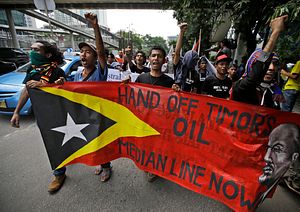Earlier this week, Australia and Timor-Leste finally reached an expected agreement that defined the maritime boundary between the two countries. The deal holds potentially immense significance for Timor-Leste, not only because it is a step toward ending years of acrimony over its disputed border with Canberra, but also because it opens a pathway for development of the potentially lucrative Greater Sunrise gas fields, which could be a boost for its economy.
The border dispute between Canberra and Dili has continued to fester since Timor-Leste gained independence from Indonesia in 2002, with the issue rooted in agreements that date back decades earlier. That had resulted in oil giants Woodside Petroleum, ConocoPhillips, Royal Dutch Shell, and Osaka Gas mothballing Greater Sunrise.
But that could soon change, with Canberra and Dili expected to sign a maritime border agreement at the United Nations in New York on March 6, to be witnessed by Secretary General Antonio Gutteres, following an agreement after talks held in Kuala Lumpur.
Should things proceed as planned, the resolution of the border dispute and then the potential go-ahead for resource development would be a boost for Timor-Leste’s economy. It would also go a long way in helping resolve one of the significant challenges in the country’s foreign policy ahead of elections expected in a few months’ time as well as its pending bid to join ASEAN.
Many of the exact details of the deal have not been released. However, Portuguese media have reported Timor-Leste could secure as much as 80 percent of the returns, and that would be a boost in ensuring the tiny country’s economic sustainability. Greater Sunrise contains energy deposits worth around $50 billion, according to some estimates.
Timor-Leste began negotiating an agreement in 2004, arguing the border should be drawn at the halfway point from Australia. That would have enabled Timor-Leste to claim most of the oil and gas field, upsetting Australia, which had already negotiated a deal with Jakarta when Timor-Leste was ruled as part of Indonesia.
Lead-manager in the project, Woodside Petroleum, said the agreement would “help to provide the fiscal and regulatory certainty” needed to develop the field but other issues still need to be resolved, and that includes an agreement on where and who will process the oil and gas.
For instance, Dili wants refineries built on its shores and efforts made to train locals and provide jobs. But the operators have balked, citing the Timor Trough, an undersea trench that plunges to depths of between 3 and 5 kilometers. Costs associated with building an 80 centimeter pipeline through the trench would be astronomical and render Greater Sunrise unviable.
Instead, Woodside and its partners would prefer to bring in the latest technology built on massive pontoons, which would enable the company to process at sea before shipping to market. Another alternative is to construct a pipeline to Darwin on Australia’s north coast.
The recent inroads made follow on from progress seen late last year. A historic breakthrough leading to the agreement was announced in the Permanent Court of Arbitration in The Hague last September, enabling the final agreement to proceed. The announcement was described by former President and Prime Minister Xanana Gusmao as heralding “a new era in Timor-Leste’s friendship with Australia.”
The independence leader said that the agreement followed a “long and at times difficult process, to help us achieve our dream of full sovereignty and to finally settle our maritime boundaries with Australia.”
Australia’s relationship with Timor-Leste has been strained due to this issue, with the border dispute and development of Greater Sunrise at times shrouded by other allegations such as spying and bullying by Dili’s much larger neighbor. That’s unfortunate, particularly given Australia’s other contributions to Timor-Leste.
Given the history of this issue as well as the other present and future domestic and foreign policy challenges Timor-Leste faces, one can only hope that the “new era” Gusmao referred to in the country’s ties with Australia will in fact come into being.
Luke Hunt can be followed on Twitter @lukeanthonyhunt.

































